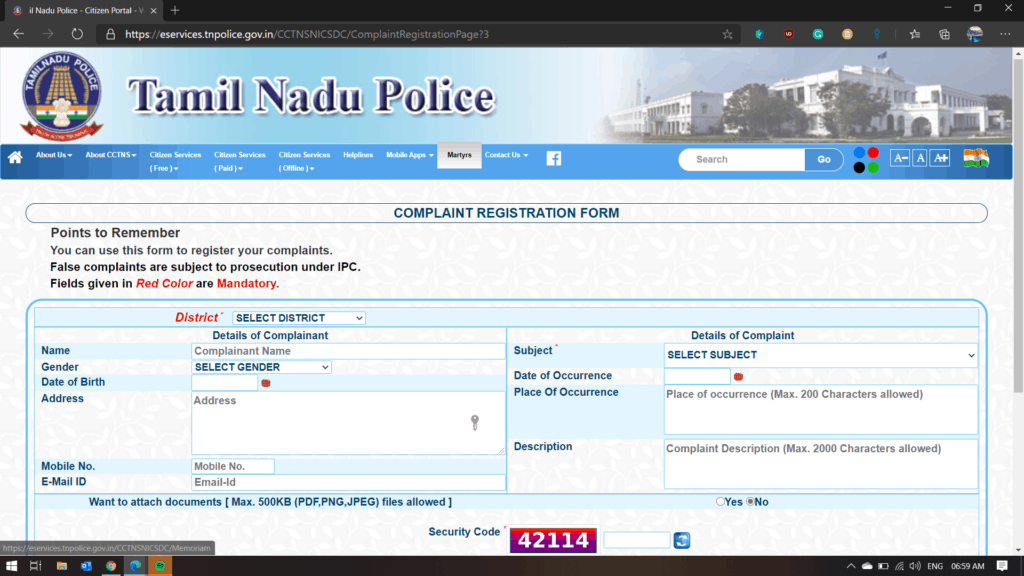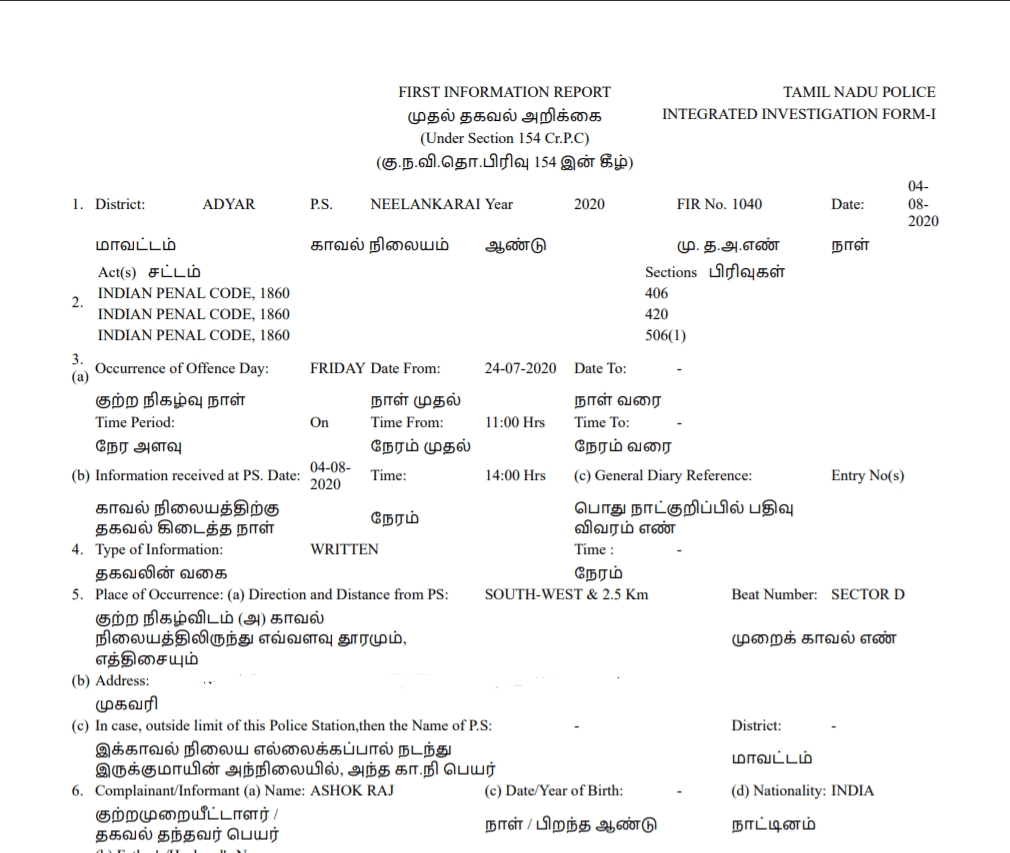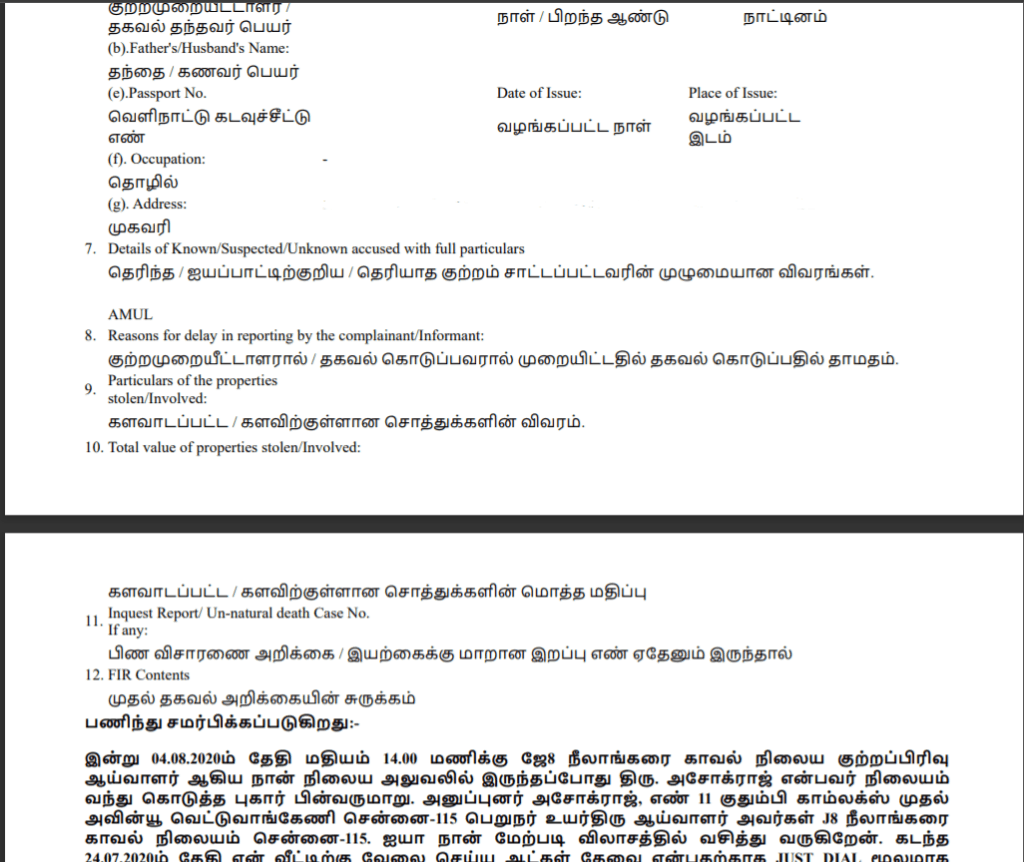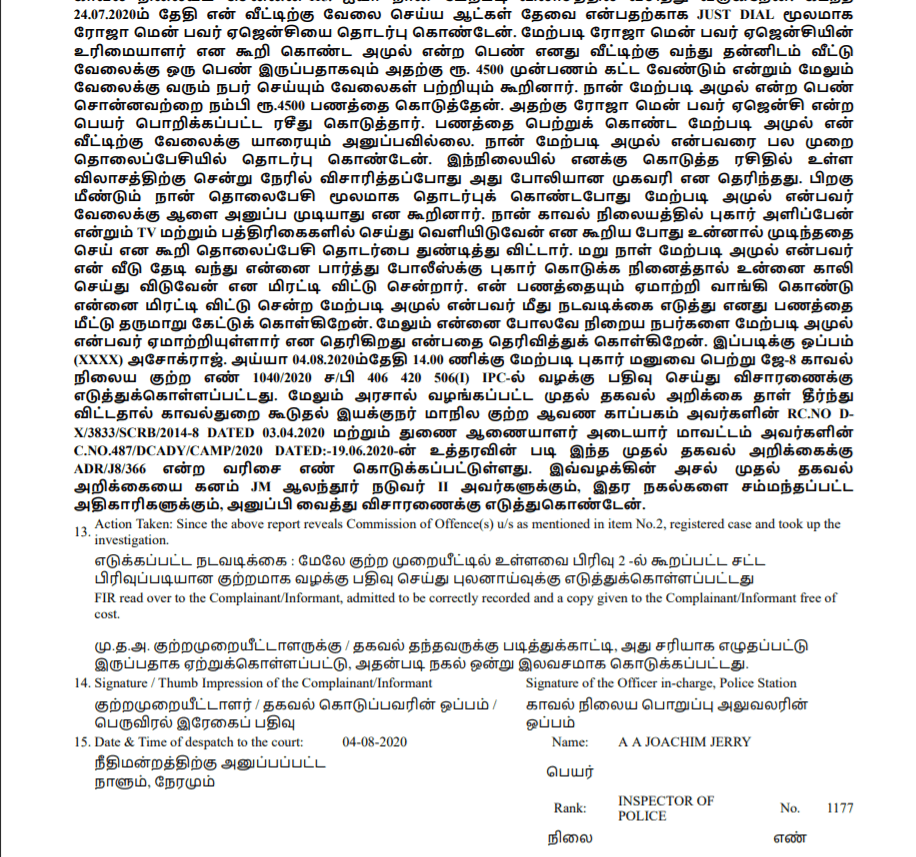Ashok Raj, a resident of Vettuvankeni, was recently cheated of Rs 4,500 by a city-based manpower agency providing domestic househelp services. The help never turned up even after the money was paid and multiple calls made to the agency did not evoke a response.
Ashok soon realised he had been cheated and came to know that the agency has been engaged in serial fraudulent activities over the past few years. He subsequently got in touch with other victims. Collectively, they visited J8 Neelankarai police station to file a case against a manpower agency under cheating/fraudulent charges.
The officials initially were reluctant to file an FIR because the issue was not considered “a serious crime”. Ashok then escalated the issue to the Deputy Commissioner of Police (DCP), Adyar.
Upon receiving directions from the DCP, the Neelankarai police team arrested the offender who had registered herself as a service provider with justdial.com. The petition was registered and followed up by the newly formed cyber cells in all 12 Greater Chennai Police districts.
While most citizens want to avoid any kind of brush with the police, knowing when and how to register a police complaint and what to do in case the police refuses to file an FIR is extremely important for each one of us.
An aggrieved complainant has every right and power to file an FIR in case of a cognizable offence, irrespective of the perceived seriousness of it.
How, you ask? Well here is an FAQ that will explain the process to you.
What is a First Information Report (FIR)?
Generally, offences are categorised into cognizable and non-cognizable offences by the Indian Criminal Procedure Code (CrPC). An FIR is a document recording the cognizable offence given by a complainant and filed by the police department. Investigating a case without an FIR is not possible in a criminal case, and hence filing of the FIR constitutes a very important step in the entire process towards justice.
Cognizable offences include murder, rape, dowry-related cases, kidnapping, theft, criminal breach of trust and the likes. Complaints of such crimes have to be registered as FIR.
If an FIR is filed, the police department has the authority to arrest the wrongdoer without warrant and investigate without Magistrate’s orders.
In the case of non-cognizable offences, a warrant is required to arrest and a judicial order is necessary to investigate the case. Incognizable offences are comparatively less serious in nature. Examples of non-cognizable offences include assault, cheating, forgery and the likes.
Who can lodge an FIR and how can it be done?
Any victim of a cognizable offence, or anyone who knows about the commission of a cognizable offence, can lodge an FIR, either online or offline.
- A police officer who comes to know about a cognizable offence or has witnessed one can file an FIR himself/herself.
- Any person who has witnessed the offence can file a complaint.
- If the police officer is on rounds and receives information on a call, he will write down the complaint and register it as an FIR as soon as he reaches the police station.

- For online registration, visit https://eservices.tnpolice.gov.in/CCTNSNICSDC
- Select ‘Register Complaints Online’ option and select the District
- Enter the details of the crime. Once it is filed, the complainant can check the status of the FIR online and would be contacted by the police station once the investigation is underway.
Attempts to commit crime, charging exorbitant interest, conspiracy, counterfeiting of currency and criminal intimidation and cyber crimes are some of the cognizable crimes that can be registered online.
- For offline registration, an FIR is generally lodged by the victim of a cognizable offence or by someone on his/her behalf either orally or in writing at the police station covering the jurisdiction. An FIR can be filed in oral or written format.
For a list of all police stations in Chennai with contact numbers, visit here.
What are the details recorded in the FIR?
Name of the offender, address of the offender (if available), crime committed, nature of the crime, date, time, place and jurisdiction of the crime’s occurrence and section of the law contravened.
What happens after an FIR is recorded? What are the duties of a police official?
According to Chennai Police Manual, the police department should execute the investigation in the following order as prescribed in the CrPC Section 154.
- Registration of FIR
- Examination of witness
- Visit of investigating officer at the scene of offence
- Collection of evidence
- Preparation of site plan
- Arrest of the accused
- Recording of confessions
- Obtaining police/judicial custody remand
- Search
- Seizure
- Preparation of case diaries etc
- Filing of charge sheet
Within 24 hours of recording an FIR, it should be submitted to the jurisdictional Magistrate. According to Section 161(3) of CrPC, the police officer should record the statements of several parties — victim, witness and the offender — and take the case forward based on the investigation.
A charge sheet has to be filed within 90 days starting from the date on which the FIR was recorded. It is the final report prepared by the law enforcement agencies for proving the accusation of a crime linked with any offence or has committed a crime punishable under the judicial grounds.
The following information is recorded in a charge sheet:
- Details of the accused and the witness
- Charges and specifications
- Preferring of charges and their referral
Upon submitting the charge sheet to the court, prosecution proceedings begin in the judicial system. Along with the charge sheet, the investigating agency should submit statements from everyone involved in the case, forensic report, expert opinion and other details.
If an FIR is filed by mistake, the police department has the liberty to close the FIR. If the authorities take a suo motu decision to close the FIR without conducting proper enquiries, the complainant can reopen the case by filing a protest petition with the Magistrate against closure of the report.
What are the rights of a complainant who has filed an FIR?
- The complainant has all the rights to avail a free copy of an FIR soon after it is filed.
- If the complainant makes a confession that is not recorded in the FIR, it cannot be considered as an argument point.
- A complainant cannot file more than one FIR in one case.
What happens if a complainant files a false FIR?
- If judicial action is initiated, the complainant will be slapped with contempt of court charges.
- If the case is lodged against another person, s/he may file a defamation case against the complainant or claim damages for causing inconvenience.
What happens when you delay filing an FIR?
There is no time limit for filing an FIR, but information for cognizable offences should be reported to the law enforcement agencies without any delay. On failing to do so, it may be treated as afterthought or doubtful, unless and until one has a substantial reason (varies from one case to another) for the delay in reporting.
When an FIR is registered soon after a cognizable crime, such as a murder or bank robbery is committed, the evidence remains intact and helps the investigating officer to proceed without trouble. The chances of facts being contorted or damaged is more if the complainant delays to lodge an FIR.
In practice, is it difficult to lodge an FIR?
According to Indian Penal Code Section 427, a complainant has rights to register an FIR as long as the financial loss amounts to more than Rs 50. However, in many cases, the police department turns away people who approach them to register a case involving relatively smaller amounts of money.
“I lost my wallet while travelling by bus; I had Rs 4,000 and a couple of identity proofs. When I approached the police station, they said it would be difficult to file an FIR and refused to file an FIR,” R Ajith, a resident of Egmore, says.
“Not just in cases of financial fraud, discouraging victims or complainants from filing an FIR has been noted in several instances, even when the crime is serious. Once an FIR is lodged, the department has to work, follow-up with the case and discuss the number of cases resolved in the weekly crime meeting. Instead of bringing down the crime rate, the reporting of an offence has reduced lately. It is primarily done to portray the city in a positive light,” says Balaji Prem Kumar, an advocate practising at Madras High Court.
Balaji also states that a preliminary inquiry, which is commonly conducted by the cops, before filing an FIR is against CrPC norms.
What can I do if the police refuse to register an FIR or delay it?
- Escalate the issue with the superior officer and follow up consistently. “When a complainant is aware of the rights and stays in the loop with the officials, the authorities will be keen to resolve the case,” adds Balaji.
- According to Section 156(3) of CrPC, a complainant can approach the court by registering a private complaint about not registering an FIR. The person can get a direction from the jurisdictional court or Madras High Court to register an FIR. Any Magistrate empowered under section 190 may order such an investigation.
- A complainant may directly approach the court of law upon refusal of filing an FIR.
- Identify the Magistrate court in your jurisdiction. In Chennai, Metropolitan Magistrate Courts are located at Egmore, at Allikulam, George Town, Saidapet, Kellys, Central Railway Court and Egmore Railway Court.
- During the petition call that happens every day at court in the morning, a petition requesting direction to file an FIR can be submitted through a lawyer or can be done by the individual himself and can be followed up from there.
(With inputs from S Vinoth Kumar and Balaji Prem Kumar, practising advocates at the Madras High Court.)



Very good and detailed useful information for common people.
Kudos to these advocates for their detailed article.???
Excellent Article, I wish we had more professionals like Ma’am Bhavani to help us citizens
Very useful info. Excellent article.